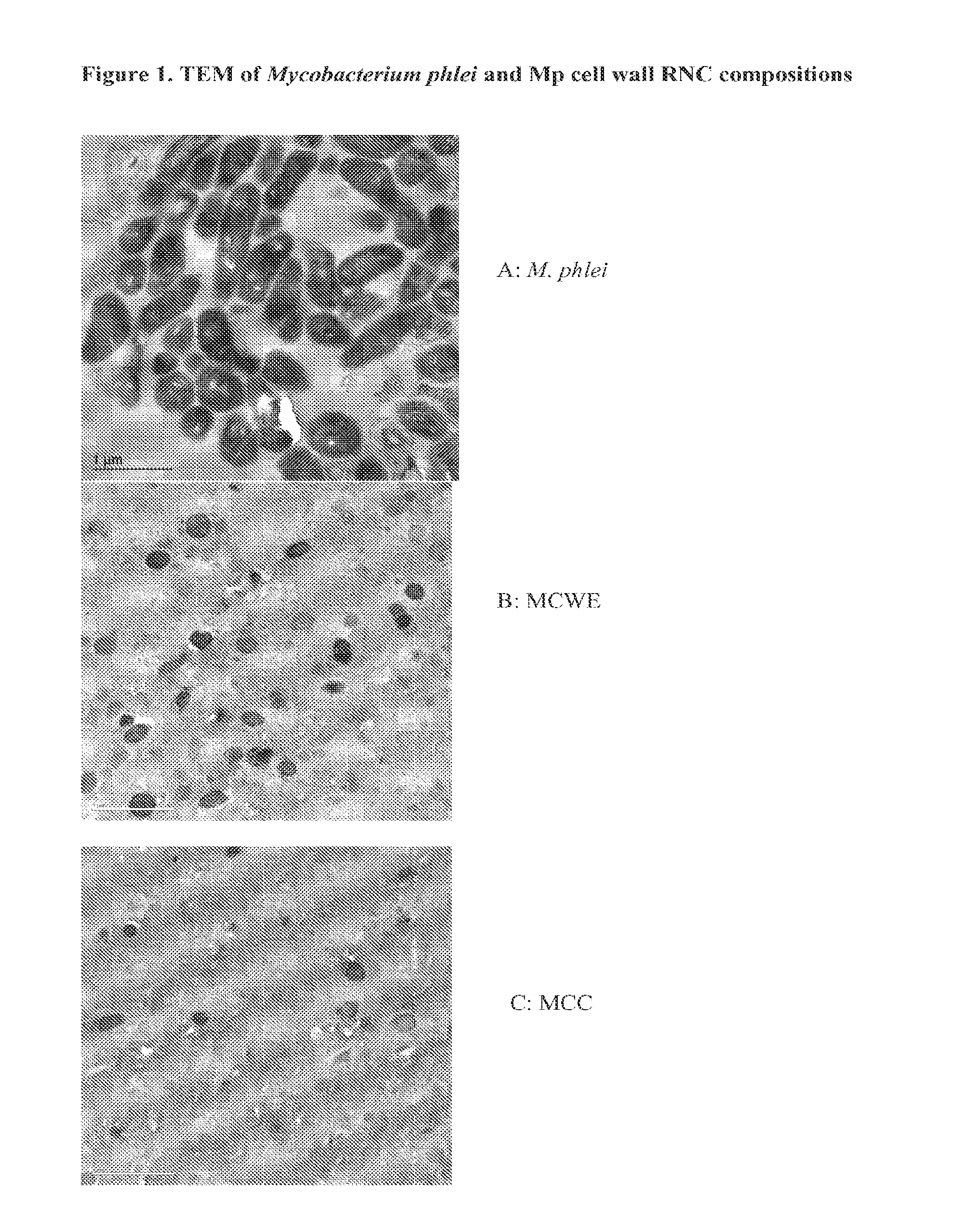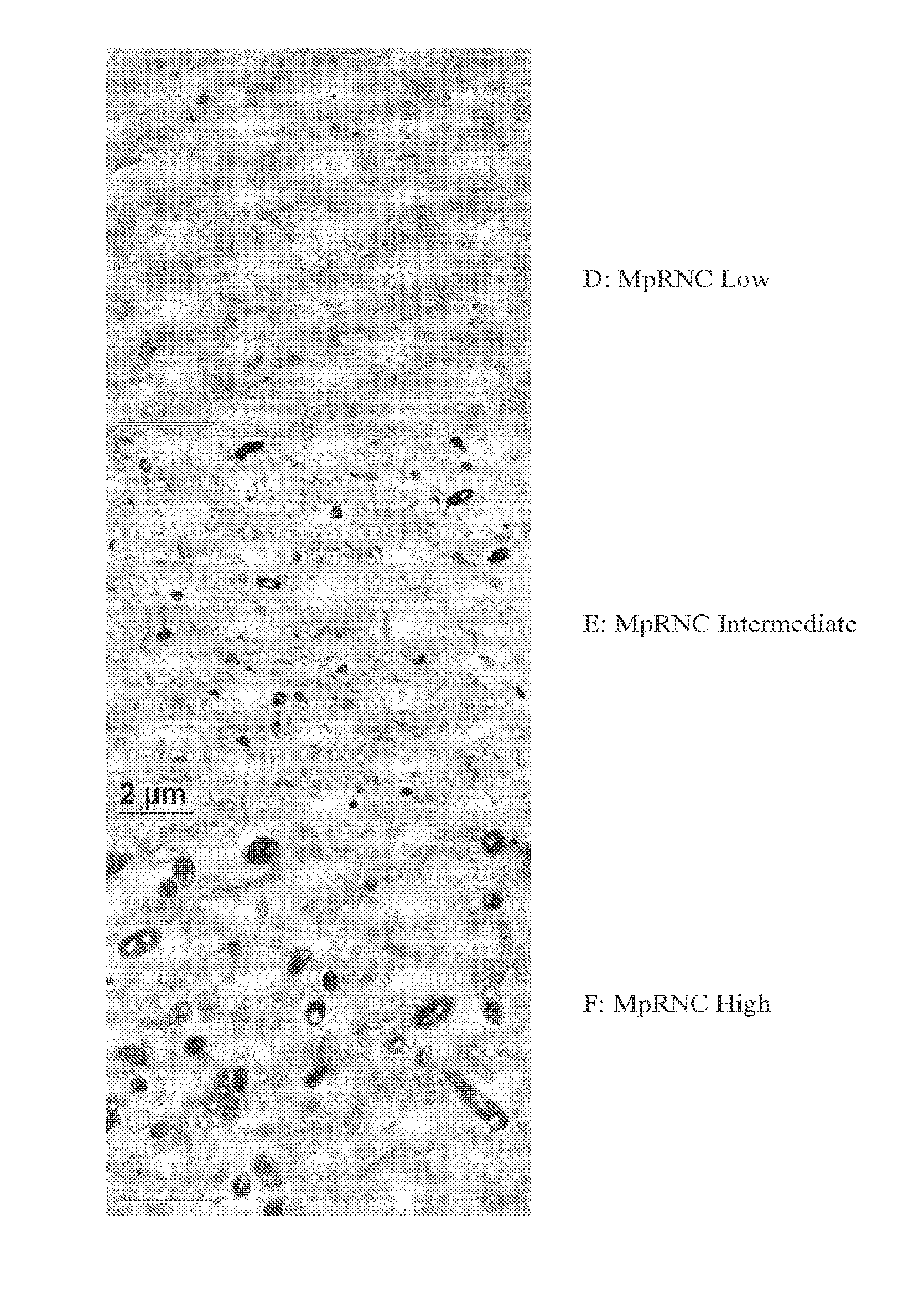Bacterial Ribonucleic Acid Cell Wall Compositions and Methods of Making and Using Them
a technology of ribonucleic acid and composition, which is applied in the field of compositions comprising bacterial rna and bacterial cell walls, can solve the problems of cancer treatment that continues to be a problem, surgery that often fails, and chemotherapy that also fails, and achieves the effect of preventing or treating myelosuppression or, effective treatmen
- Summary
- Abstract
- Description
- Claims
- Application Information
AI Technical Summary
Benefits of technology
Problems solved by technology
Method used
Image
Examples
example 1
Cultivation of Mycobacteria in Synthetic Medium
[0165]The preparation of mycobacterial cell wall compositions as taught in U.S. Pat. No. 4,744,984 and U.S. Pat. No. 6,326,357 specified the use of BACTO™ AC broth (Difco Labs, now Becton Dickenson) for the preparation of mycobacterial cell mass. This broth contains proteose peptone No. 3, beef extract, yeast extract and malt extract (Difco™& BBL™ Manual of Microbiological Culture Media, second edition, 2009, pp 35-36). In addition, seed stocks of Mycobacterium phlei used as the example in these patents were stored in bovine milk prior to generation of biomass. The aforementioned patents also teach that cultivation is static, and that the mycobacterial cultures grow as a surface pellicle on the culture medium.
[0166]In order to eliminate the potential for contamination of mycobacterial biomass by the aforementioned substances, a novel synthetic medium was developed for the cultivation of mycobacteria. Middlebrook 7H9 broth is known to th...
example 2
Controlling the Number of Intact Mycobacteria During the Preparation of Immune Stimulatory and Anticancer Compositions
[0188]The following example identifies new procedures for the preparation of the compositions of the present invention that use working volumes that are scalable, range from several mL to multi-liter volumes, and that result in the efficient production of new bacterial compositions comprising nucleic acids and cell walls.
[0189]Mycobacterial cell mass (Mycobacterium phlei is used as an illustrative and representative example of mycobacterial cell mass) was prepared as described in Example 1. After pelleting by low-speed centrifugation to remove culture medium components, M phlei cells (prepared as a 10% w / v suspension in DNase- and RNase-free water for injection) was disrupted by high-pressure homogenization (18,000 pounds per square inch [PSI], 5 cycles, at a temperature of 4° C.) using an Avestin EmulsiFlex-05 high-pressure homogenizer (Avestin, Ottawa, Ontario, Can...
example 3
Preparation of Compositions Comprising Mycobacterial Cell Walls and RNA (MpRNC)
[0194]To further demonstrate the utility of the new approach described above to prepare mycobacterial cell wall compositions, new procedures were developed that required the use of different homogenization pressures and number of homogenization cycles that enabled the preparation of new mycobacterial cell wall-RNA compositions (MRNC) formulated with mycobacterial cell walls and comprising: a) a controlled reduction in the intact mycobacterial cell content; b) the generation of oligoribonucleotides and polyribonucleotides of defined length, and c) the generation of unexpected immune stimulant activity.
[0195]In this example mycobacterial cell mass (Mycobacterium phlei is used as an illustrative and representative example of mycobacterial cell mass, and it is to be realized that the manufacturing procedures described in this example are applicable to both bacteria and mycobacteria) was prepared as described ...
PUM
| Property | Measurement | Unit |
|---|---|---|
| pressures | aaaaa | aaaaa |
| volume | aaaaa | aaaaa |
| volume | aaaaa | aaaaa |
Abstract
Description
Claims
Application Information
 Login to View More
Login to View More - R&D
- Intellectual Property
- Life Sciences
- Materials
- Tech Scout
- Unparalleled Data Quality
- Higher Quality Content
- 60% Fewer Hallucinations
Browse by: Latest US Patents, China's latest patents, Technical Efficacy Thesaurus, Application Domain, Technology Topic, Popular Technical Reports.
© 2025 PatSnap. All rights reserved.Legal|Privacy policy|Modern Slavery Act Transparency Statement|Sitemap|About US| Contact US: help@patsnap.com



